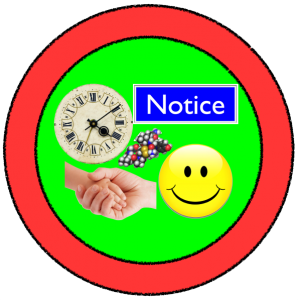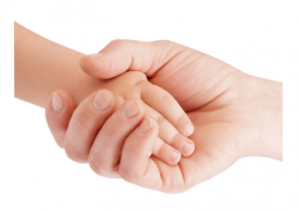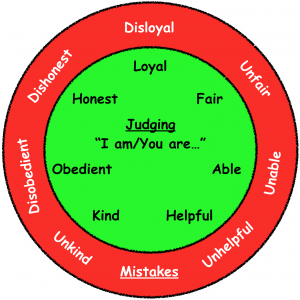Judging that we belong feels great, it is hugely rewarding and is very, very important. To feel we belong we need people to treat us from the Green Zone, and we will come to learn that our own Green Zone behaviour is rewarded with even more Green Zone from others. A virtuous circle where everyone can feel they belong. (Green Zone is behaviour that is loyal, kind, helpful, honest, skilful/able, fair and compliant with the group norms).
If we receive mostly Red Zone behaviour from others we will not feel that we belong. As a result we will feel alienated and distrustful of people, we will not care about them. We may come to learn that our best way of being able to get what we need is to control others, dishonestly taking from them, or even hurting them.
The feeling of belonging is associated with a hormone called oxytocin (shown in the middle of this diagram). This molecule is sometimes called the love hormone or the trust hormone. It is also believed to be involved in a darker side, the suspicion and rejection of outsiders.

So, we all need regular doses of oxytocin to create that sense of belonging. How do we make sure the people we care about feel that they belong? That they can trust us, believe us, and feel safe with us.
We have called this the ‘currency of belonging’ and we describe four types of currency: Time, Kind Touch, Smile and Notice.
We can all understand the extraordinary power of these straight away, as they are so natural and should be common place. Sadly, in our busy and stressful lives, we sometimes forget. Our focus goes to what is wrong, rather than what is right. This is natural, as we need to spot things that will harm us, but we should consider the damage this can cause to our relationships.
Unlike money, this currency is free, and always available. Imagine having them in your pocket ready to spend at every opportunity, they are always with you.
Untarnished Time

Untarnished time means spending time with another person, having fun, not being critical, or controlling, and helping them to think
about and solve their own problems without telling them what to do. It means being curious about them, listening to their stories and taking turns, not just talking about ourselves.
Kind Touch

Holding hands, having a cuddle, a kiss or a gentle stroke or pat, can be very comforting, so long as it is appropriate and welcome.
Smile

Why do we smile and laugh? Smiling is an automatic skill that babies develop at a very young age. It is our body response, often automatic, when we feel, or wish to be, connected to another person. We smile when we feel safe, and feel we belong, and we smile to show others that we are happy for them to feel connected to us, that we are not a threat to them.
In the wild, and even in our society, it is people who are most likely to harm us. When we see another person we need to very quickly decide whether or not they are a threat, or whether they may help. Sight is the major sense that we use to satisfy our need to know if someone (or a predator) has seen us, or is interested in us for any reason. This is why we instinctively look at another’s eyes, we need to know what they are looking at, whether they have noticed us. Try looking into someones eyes, they may look away, which is their signal that they are not a threat, or they may smile to break the tension and indicate that they are happy to connect. Holding eye contact without a smile can feel very threatening.
When someone smiles at us, we get a small burst of oxytocin as we feel connected to them, and we also feel the relief of being safe.
Smiling is an instinctive body response to how we feel, this also works the other way around, if you force your mouth into a smile you may well give yourself a nice feeling!
Some people may use smiling and being helpful and so on as a means to take advantage, so we do need to be aware. But generally, people use smiles genuinely.
Laughing is a progression from smiling and is a signal to others that we are enjoying their company. We may also laugh when we are pleasantly surprised (curiosity) about things that are occurring.
Notice

We instinctively tend to notice what is wrong, after all it will be the things that are wrong that will cause us harm in the wild, so we need to notice them first.
This can mean that we can come to only notice what is wrong and forget to reward good behaviour. We need to notice good behaviour far more than we criticise or command.
We describe three types of noticing:
How they are doing
Take time to notice the good things another person does and tell them. By doing this you are judging their ability, and will help them to judge themselves as being able, and so increase their confidence. It may be helpful to add how their actions are making you feel.
Relate what they are doing to Green Zone behaviours such as “Sharing your toys with your brother is really kind” and “It makes me feel really happy when you help by putting the dishes away”.
They will start to see themselves as increasingly valuable members of the tribe, and will be seeking to improve their skills. Once a skill has been learnt we should raise the bar, expect a little more the next time.
How they are
Describe qualities or characteristic of a person that please you, so long as it is true! “You have a lovely smile”, “You look really smart in those clothes”. Try to avoid too much of this as it may become counterproductive, “You are so talented”, “You are so clever” etc as they may believe they know enough and stop learning!”
How they feel
When we judge that another person understands how we are feeling, we sense that they are kind and that they may be able to help us. We connect and start to feel a little better as we sense we are not alone.
You may not necessarily agree with how another person is feeling, but you can understand. Seek to be have empathy for them and try to avoid taking control unless you really need to.
“You must be really tired after being at school all day”
“I expect you are really hungry, we are having a good meal later on so just have a little snack”
“Its really sad that Joe and John are playing and don’t want you around today, it doesn’t feel very good to be left out”
Spending Our Currency Of Belonging
Try to make spending our currency, untarnished time, kind touch, smiling and noticing a new habit. Use them wisely, as others need to be in the Green Zone before you give them. If you reward Green Zone, you get Green Zone. If you reward Red Zone, you get Red Zone.
We need to spend them on ourselves as well!

